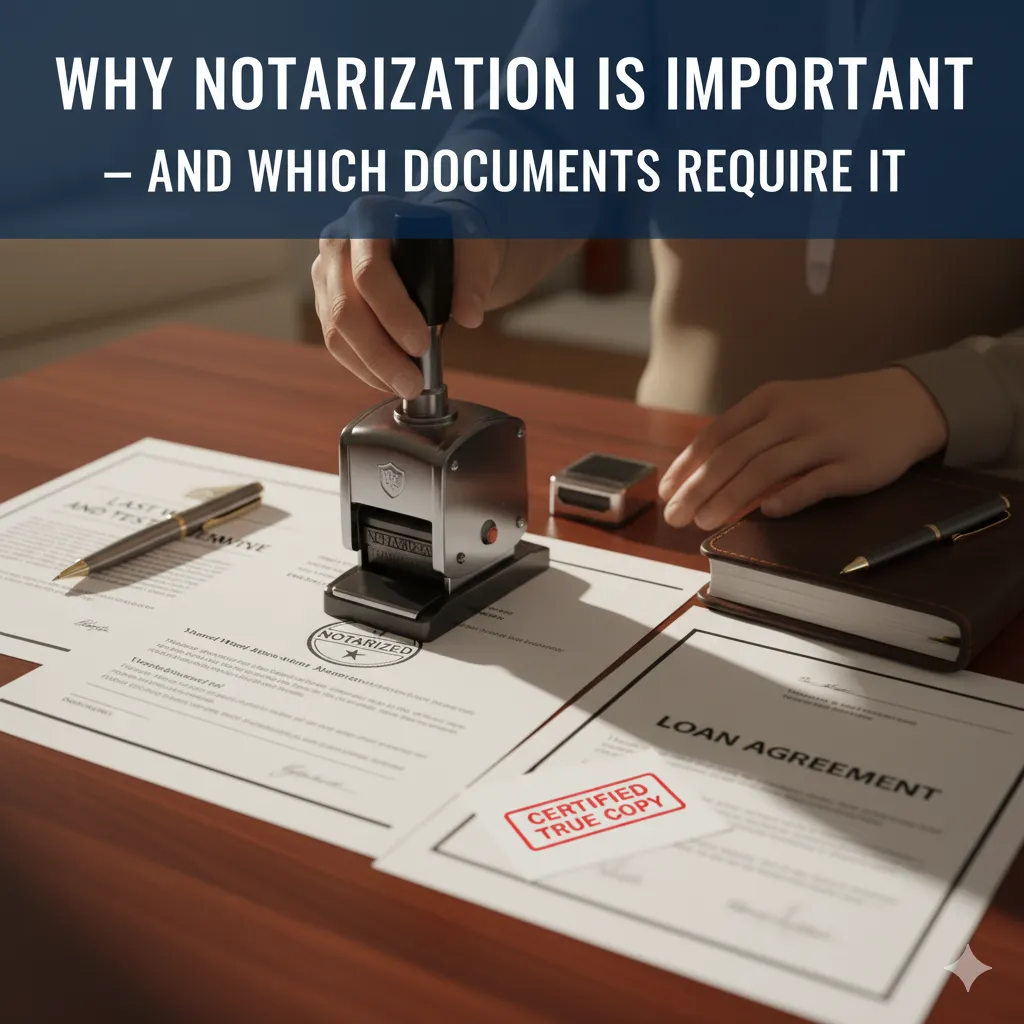In the world of legal documents, authenticity and trust are everything. Whether you are buying property, preparing a will, or signing an agreement, one small mistake in paperwork can create serious problems later. That’s where notarization comes in — a simple but powerful process that gives your documents legal credibility and ensures they can be trusted by all parties involved.
In this post, we’ll explain what notarization is, why it’s so important, what types of documents need it, and how a notary public can help protect your rights and interests.
1. What Is Notarization?
Notarization is the official process of verifying and certifying the authenticity of a document or a signature. It’s carried out by a Notary Public, a government-authorized legal professional who acts as an impartial witness.
During notarization, the notary:
- Confirms the identity of the person signing the document,
- Ensures that the person is signing voluntarily and understands the content, and
- Attests that the document is genuine and free from fraud.
Once verified, the notary stamps and signs the document — officially marking it as notarized. This notarized seal serves as proof that the document is valid and can be relied upon in legal or official proceedings.
2. Why Is Notarization Important?
Notarization plays a vital role in preventing fraud, ensuring legal validity, and promoting trust in both personal and business transactions. Below are some of the most important reasons why notarization matters:
A. Prevents Forgery and Fraud
A notary’s job is to confirm that the person signing the document is who they claim to be. This prevents someone from forging signatures or impersonating another person for illegal gain.
B. Adds Legal Authenticity
Notarized documents are widely accepted by courts, government agencies, and financial institutions. The notary seal signifies that the document meets all legal standards of authenticity.
C. Ensures Informed Consent
The notary also ensures that all parties understand what they’re signing and are doing so voluntarily. This helps avoid disputes about coercion or misunderstanding in the future.
D. Facilitates Legal Proceedings
In court, notarized documents are considered self-authenticating, which means they don’t require further proof of validity. This makes legal processes faster and smoother.
E. Builds Trust Between Parties
In transactions like property transfers or loan agreements, both sides gain confidence knowing that the documents have been verified by a neutral authority.
3. Which Documents Require Notarization?
Not all legal documents need to be notarized — but for certain categories, it’s either mandatory or highly recommended. Here’s a breakdown of the most common documents that require notarization:
A. Property and Real Estate Documents
- Sale or purchase agreements
- Deeds and title transfers
- Lease agreements
- Mortgage papers or loan agreements
Since property transactions involve large financial commitments, notarization ensures that all parties are genuine and the transaction is legitimate.
B. Wills and Power of Attorney
- Last Will and Testament
- General or Special Power of Attorney
- Medical Power of Attorney
These documents deal with highly sensitive personal and financial matters. A notary ensures that the person signing is of sound mind and understands the implications.
C. Affidavits and Declarations
- Sworn affidavits for court or administrative purposes
- Name change declarations
- Address or identity proofs
An affidavit must be signed under oath before a notary public to be legally valid.
D. Business and Commercial Documents
- Partnership agreements
- Contracts and MOUs
- Company incorporation papers
- Board resolutions
For business dealings, notarization helps prevent future disputes and adds a layer of official credibility to the documents.
E. Immigration and Travel Documents
- Sponsorship letters
- Consent letters for minors traveling abroad
- Copies of passports or IDs
Notarization here serves as proof that the documents and signatures are genuine and have not been tampered with.
F. Educational and Employment Documents
- Degree certificates (for foreign use)
- Employment verification letters
- Experience certificates
These often require notarization for overseas applications, especially when submitting to foreign embassies or institutions.
4. The Process of Getting a Document Notarized
Many people assume notarization is complicated, but it’s actually a straightforward process. Here’s how it usually works:
Step 1: Visit a Licensed Notary Public
You can find a notary at law offices, government centers, or authorized independent notary services.
Step 2: Bring the Original Document and Valid ID
You’ll need to carry a government-issued ID (like a passport, Aadhaar, or driver’s license) to verify your identity.
Step 3: Sign in the Presence of the Notary
You must sign the document in front of the notary — not before. This ensures the notary can confirm that you signed voluntarily.
Step 4: Notary Verification and Seal
The notary will review the document, confirm your identity, and then apply their seal and signature, making the document officially notarized.
Step 5: Record and Receipt (If Applicable)
Some notaries maintain a record of all documents notarized for legal reference.
5. Common Misconceptions About Notarization
There are several myths about notarization that often cause confusion. Let’s clear up a few:
Myth 1: Notarization Makes a Document Automatically Legal
Notarization confirms authenticity, not legality. The document must still comply with relevant laws and regulations.
Myth 2: Any Lawyer Can Notarize Documents
Only lawyers specifically appointed as Notary Public by the government have the authority to notarize documents.
Myth 3: Scanned Copies of Notarized Documents Are Equally Valid
In most cases, only the original notarized document holds full legal weight — digital or scanned copies are not considered official unless e-notarization is allowed.
Myth 4: Notarization Is Only for Property or Legal Disputes
Not true — notarization is also needed for academic, travel, and even simple identity verification documents.
6. Benefits of Using a Professional Notary Service
Choosing a professional and experienced notary service offers several advantages:
- Convenience: Quick and smooth process with correct paperwork
- Accuracy: Avoids rejection or delays due to document errors
- Compliance: Ensures the document meets government and legal standards
- Peace of Mind: Confirms your document is legally trustworthy
A legal firm offering notary services can also guide you on whether a document truly needs notarization or another form of legal certification like attestation or apostille.
7. Final Thoughts
Notarization may seem like a small step, but it holds big importance in the legal world. Whether you are dealing with real estate, personal documents, business contracts, or immigration forms — a notarized seal acts as a protective shield against fraud, disputes, and invalid claims.
If you have documents that need notarization or if you’re unsure whether a specific document requires it, it’s always best to consult a professional notary or legal expert. They can ensure everything is done correctly and in compliance with the law — saving you from unnecessary complications in the future.
Key Takeaway
“A notarized document isn’t just a formality — it’s a guarantee of trust, authenticity, and legal protection.”






